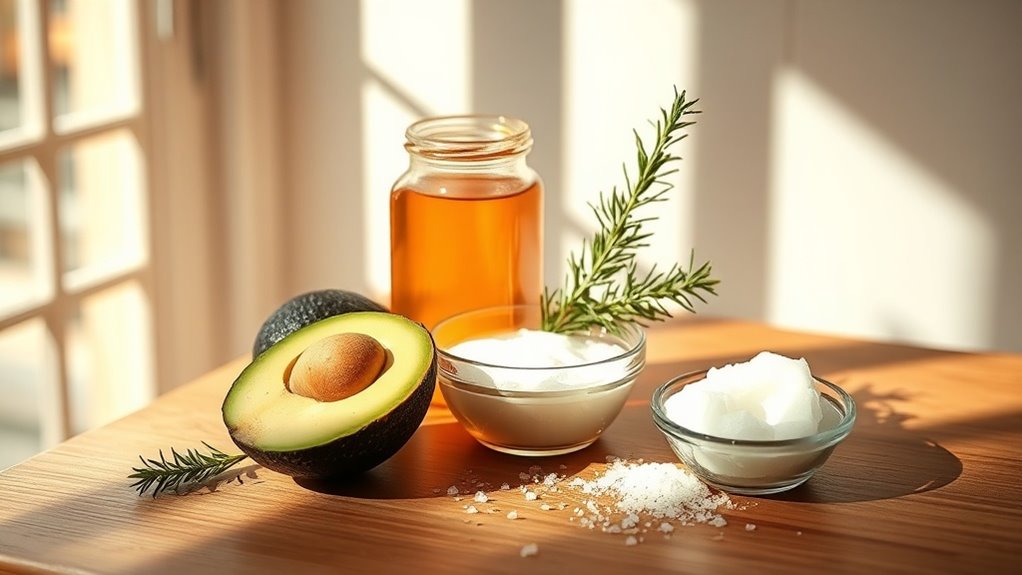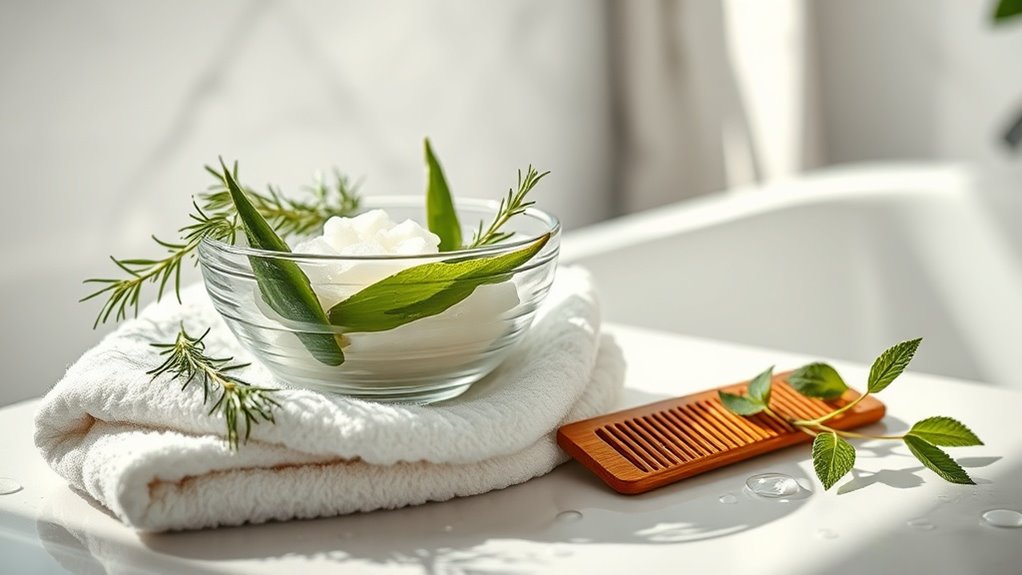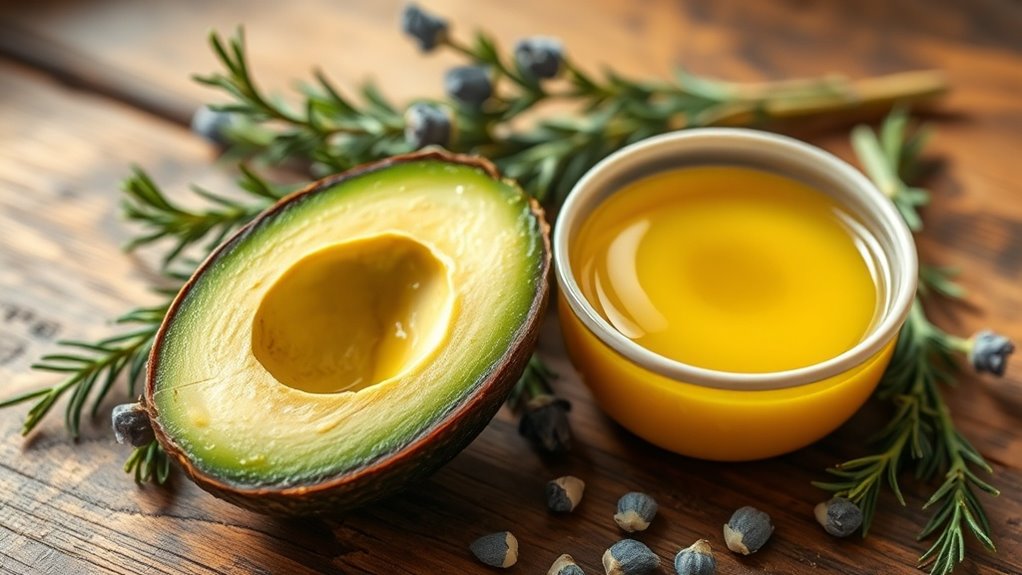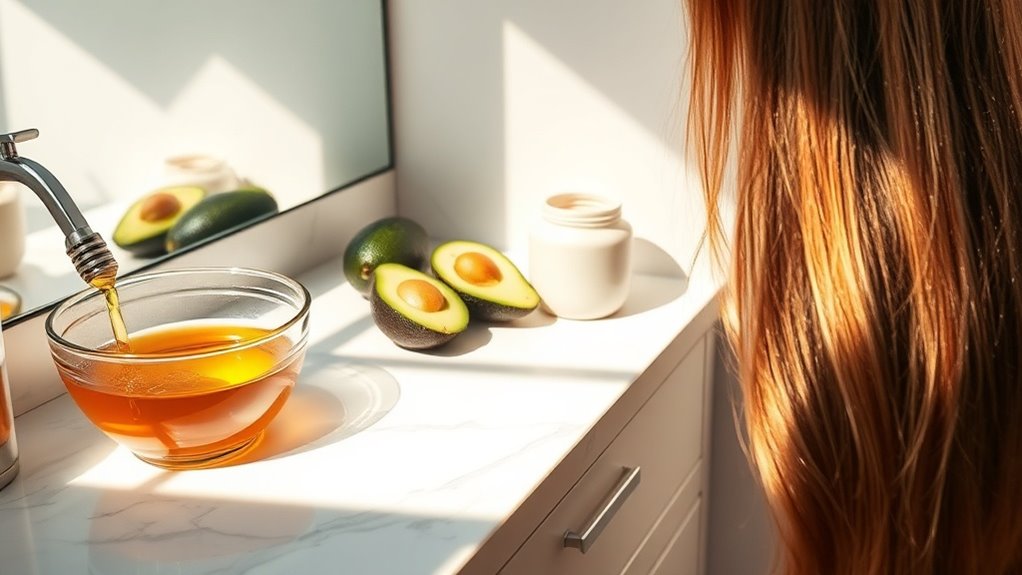Stop Scalp Itch With This Herbal Rinse
To stop scalp itch, try a soothing herbal rinse made with chamomile, nettle, and tea tree oil. These natural ingredients nourish your scalp and restore its balance while relieving irritation. Just boil water, steep the herbs, and let cool before applying it on damp hair. Massage it gently for the best effect and rinse after 15 minutes. Consistency is key for lasting relief, and there’s much more you can explore to enhance your scalp health.
Key Takeaways
- Use a herbal rinse made from chamomile, nettle, peppermint, and tea tree oil to soothe and nourish the scalp.
- Boil four cups of water and steep two tablespoons of each herb for 20-30 minutes to extract beneficial properties.
- Apply the rinse on clean, damp hair, sectioning it for even distribution, and massage gently to stimulate circulation.
- Let the herbal rinse sit for at least 15 minutes before rinsing to maximize its soothing effects on scalp itch.
- Maintain a clean scalp with gentle, sulfate-free shampoo and stay hydrated for optimal scalp health and itch relief.
Understanding Scalp Itch
Understanding scalp itch can feel overwhelming, but recognizing its causes is the first step toward relief. You might find that a natural itchy scalp solution can help you regain comfort and balance.
Consider incorporating herbal rinses into your routine, as they can soothe irritation effectively. Ingredients like chamomile, peppermint, or tea tree oil offer anti-inflammatory and antifungal properties, promoting a healthier scalp environment.
When you use these natural remedies, you’re not just masking the symptoms; you’re addressing the root of the issue. Regularly massaging your scalp with these infused rinses can stimulate blood circulation and enhance overall scalp health.
Additionally, prioritizing scalp health can prevent common issues and promote stronger hair growth as part of overall preventive maintenance.
Causes of Scalp Itchiness
When you experience scalp itchiness, it often stems from a few common causes.
Dry scalp conditions, allergic reactions to products, and scalp infections can all trigger discomfort.
Understanding these factors is key to finding a natural remedy that works for you.
Dry Scalp Conditions
If you’re experiencing scalp itchiness, it might be due to dry scalp conditions, which can arise from various factors such as weather changes, harsh hair products, or even underlying skin issues.
When your scalp loses moisture, it can lead to flakiness and irritation. To combat this, consider natural remedies like coconut oil or aloe vera, which can deeply hydrate and soothe your skin.
Additionally, using a gentle, sulfate-free shampoo can help maintain your scalp’s natural oils. Incorporating a humidifier in your home can also balance moisture levels, especially during dry months.
Allergic Reactions Triggers
Have you ever considered that your scalp itchiness might stem from allergic reactions?
These reactions can be triggered by various irritants in your environment or hair care products. Identifying these sources can help soothe your scalp effectively.
Here are four common triggers to watch for:
-
Hair Products: Ingredients like sulfates, fragrances, or parabens can provoke irritation.
-
Dyes and Chemicals: Hair dyes or relaxers may cause allergic responses, leading to itchiness.
-
Environmental Allergens: Pollen, dust mites, or pet dander can aggravate your scalp condition.
-
Food Allergies: Sometimes, allergens in your diet can manifest as scalp itchiness.
Scalp Infections Overview
Scalp infections can often be a hidden cause of itchiness, as they disrupt the skin’s natural balance. Fungal infections, like ringworm, can lead to red, inflamed patches and relentless scratching.
Bacterial infections may cause tenderness and swelling, resulting in discomfort. You might also experience itchiness from scalp psoriasis, which forms silvery scales and dry patches.
To combat these issues, consider herbal remedies like tea tree oil or aloe vera, known for their antifungal and antibacterial properties. Regularly using a gentle herbal rinse can soothe inflammation and restore balance.
Always remember to maintain a healthy diet rich in vitamins and minerals to support your scalp’s health. By addressing these infections holistically, you can reclaim comfort and nurture your scalp naturally.
Benefits of Herbal Rinses
Herbal rinses offer a refreshing and natural solution for alleviating scalp itchiness. By incorporating these rinses into your routine, you’ll not only soothe your scalp but also enjoy various benefits:
-
Nourishment: Herbal ingredients deliver essential vitamins and minerals that promote healthy hair growth.
-
Hydration: They help lock in moisture, preventing dryness and flakiness that contribute to itchiness.
-
Soothing properties: Many herbs possess anti-inflammatory qualities, providing instant relief from irritation.
-
Balancing scalp: Herbal rinses can help restore your scalp’s natural pH balance, reducing excess oil and preventing dandruff.
Embracing herbal rinses as part of your hair care regimen can lead to a healthier scalp and overall well-being, allowing you to enjoy a soothing, itch-free experience.
Key Ingredients for Your Herbal Rinse
To create an effective herbal rinse, you’ll want to focus on key ingredients like aloe vera, which soothes irritation and hydrates your scalp.
Essential oils bring their own unique benefits, helping to balance your scalp’s natural oils and promote a healthy environment.
Learning proper herbal infusion techniques can maximize the potency of these natural remedies, making your rinse truly revitalizing.
Aloe Vera Benefits
Aloe vera stands out as a powerhouse ingredient in your quest for soothing scalp itch. This succulent plant is packed with natural compounds that provide relief and nourishment.
Here’s how aloe vera can benefit your scalp:
-
Hydration: Its gel-like consistency locks in moisture, keeping your scalp hydrated.
-
Anti-inflammatory: Aloe vera reduces irritation and inflammation, calming itchy skin.
-
Antimicrobial properties: It helps fight off bacteria and fungi, promoting a healthier scalp environment.
-
Nutrient-rich: Packed with vitamins and minerals, it nourishes hair follicles, supporting overall hair health.
Incorporating aloe vera into your herbal rinse can transform your scalp care routine, bringing you one step closer to relief from that pesky itch.
Essential Oils Efficacy
Essential oils play a vital role in enhancing the efficacy of your herbal rinse, providing targeted relief for scalp itch. These concentrated plant extracts deliver potent anti-inflammatory and antimicrobial properties that soothe irritation and promote a healthy scalp environment.
For instance, lavender oil calms inflammation, while tea tree oil fights fungal infections. Peppermint oil can invigorate your scalp and improve circulation, helping to alleviate that nagging itch.
Incorporating these oils into your herbal rinse not only amplifies its effectiveness but also enriches your overall experience with their delightful aromas. By choosing the right essential oils, you harness the power of nature to address scalp discomfort, making your herbal rinse a truly holistic remedy for itch relief.
Herbal Infusion Techniques
When you’re crafting an herbal rinse, selecting the right key ingredients is crucial for achieving the desired soothing effects on your scalp.
Here are four powerful herbs you can incorporate:
-
Chamomile – Known for its calming properties, it soothes irritation and promotes relaxation.
-
Rosemary – Stimulates blood circulation, which can help alleviate itchiness and enhance scalp health.
-
Nettle – Packed with nutrients, it strengthens hair follicles and reduces inflammation.
-
Peppermint – Provides a refreshing sensation while invigorating the scalp, helping to ease discomfort.
How to Prepare the Herbal Rinse
To prepare your herbal rinse for scalp itch, start by gathering a few key ingredients that promote soothing and healing.
Look for herbs like chamomile, which calms irritation, and nettle, known for its anti-inflammatory properties. You’ll also want to include peppermint for its cooling effect and tea tree oil for its antifungal benefits.
Boil about four cups of water and add two tablespoons of each herb. Let the mixture steep for 20-30 minutes, allowing the beneficial properties to infuse.
Strain out the herbs, and let the rinse cool to a comfortable temperature. You can store any leftover rinse in the fridge for a few days, making it easy to have on hand whenever you need relief from scalp itch.
Application Techniques for Best Results
As you begin applying your herbal rinse for scalp itch, ensure your hair is clean and damp for optimal absorption. Follow these steps for best results:
-
Section your hair: Divide your hair into manageable parts to ensure even distribution of the rinse.
-
Pour the rinse: Gently pour the herbal solution directly onto your scalp, allowing it to flow through your hair.
-
Massage gently: Use your fingertips to massage the rinse into your scalp, stimulating circulation and enhancing absorption.
-
Let it sit: Allow the rinse to sit for at least 15 minutes, letting the herbs work their magic before rinsing with cool water.
Additional Tips for Scalp Care
While you’re focusing on soothing your scalp itch with herbal rinses, incorporating a few additional care tips can further enhance your scalp health. Here’s a quick guide to help you maintain a healthy scalp:
| Tip | Benefits | Natural Remedies |
|---|---|---|
| Keep your scalp clean | Reduces irritation | Use gentle, sulfate-free shampoo |
| Stay hydrated | Supports skin health | Drink plenty of water |
| Massage your scalp | Boosts circulation | Use essential oils like peppermint or tea tree |
Implementing these tips aids in creating a balanced environment for your scalp, helping to alleviate itching and promote overall hair vitality. Embrace these natural remedies for a holistic approach to scalp care!
When to Seek Professional Help
Have you noticed persistent scalp itch that doesn’t improve with home remedies?
It might be time to seek professional help. Ignoring the issue can lead to further discomfort or complications.
Here are some signs that warrant a visit to a healthcare provider:
-
Severe redness or swelling: If your scalp looks inflamed, it’s a signal that something’s wrong.
-
Bleeding or crusting: Open sores can indicate an infection that requires attention.
-
Hair loss: Increased shedding or bald patches may suggest an underlying condition.
-
Associated symptoms: If you experience fever or fatigue, it’s essential to get evaluated.




